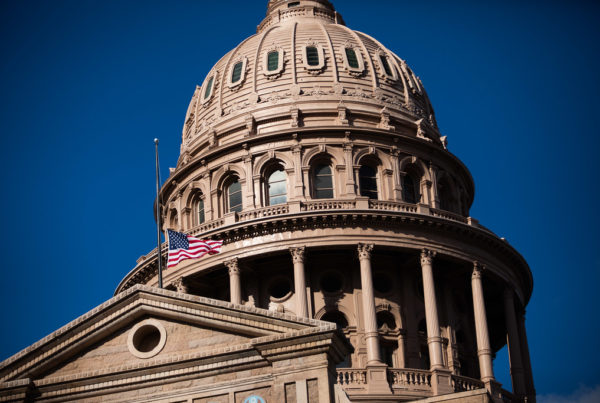From The Texas Newsroom:
It was June 25, 2013. A Tuesday. The last day of a special session in the Texas Legislature.
Many remember it as the day former Texas State Sen. Wendy Davis, a Democrat, took over the Senate floor for 11 hours, successfully filibustering a sweeping anti-abortion bill.
But for Davis, it was also a pivotal day for democracy.
“It was the first time I had ever seen that level of engaged citizenry involved in a debate that would have, of course, very meaningful consequences in their lives and the lives of every Texan,” Davis told The Texas Newsroom.
But nearly a decade later, conservative state lawmakers have passed legislation effectively banning abortion in Texas.
And more restrictions could follow if the U.S. Supreme Court overturns parts of or all of Roe v. Wade, the 1973 landmark decision that guaranteed the right to choose.
A leaked draft opinion by the Supreme Court in the case Dobbs v. Jackson Women’s Health Organization showed the majority of the justices voting to overturn abortion rights nationwide, which would send the decision back to state legislatures. The draft was authored by Justice Samuel Alito and confirmed to be authentic by the Supreme Court.
“We will not stop fighting for our right for abortion and abortion care,” Rev. Erika Forbes of Envision Justice, said during a Tuesday abortion rights rally at the Texas Capitol. “We will fight until hell freezes over and then we will fight on the ice.”
Years in the making
The story of how Texas has successfully banned nearly all abortions is one that has taken decades to write.
In 2003, Texas passed the Women’s Right To Know Act, which requires physicians to offer informational materials designed to dissuade people from seeking an abortion. For example, a 2016 state-developed brochure includes a chapter on the development of a fetus, and talks about “the potential for fetal pain.”
The law also required that all abortions at 16 weeks of gestation could only be performed in an ambulatory surgical center. According to the ACLU of Texas, “not one of Texas’ 54 non-hospital abortion providers met the standard of an ambulatory surgical center when the law took effect in 2004.”
In 2005 the Texas Legislature passed a law that banned abortions after 24 weeks and required parental consent for abortions performed on people under 18.
For Abby Johnson — founder of And Then There Were None, a ministry that encourages abortion clinic providers to leave the field — 2011 was a major turning point.
She cites a Texas law passed that year requiring those seeking an abortion to get a sonogram beforehand. The law also requires physicians to show the sonogram to the patient.
“I think that was the first really significant piece of legislation where the pro-choice movement really, really fought against and lost,” Johnson said.
Also in 2011, the Texas Legislature passed a law that slashed funding for family planning from $111.5 million to about $38 million.
Eventually, Planned Parenthood was removed from the list of Texas’s Medicaid providers. This meant that low-income patients seeking non-abortion services would no longer be able to use Planned Parenthood, the biggest abortion provider in the state.
And then 2013 happened.
‘We really can change the outcome’
In 2013, the Texas Legislature unsuccessfully considered a sweeping omnibus abortion bill.
The measure would’ve banned abortions after 20 weeks, required all abortions facilities to meet the standards of ambulatory surgical centers, and required doctors to have admitting privileges at nearby hospitals.
The bill failed to move forward in the regular session, but Republicans brought it back during a special session.
Davis, the Democratic senator, attempted to filibuster the bill during the last day of the special session.
She spoke on the Senate floor for hours while thousands of supporters flooded the state Capitol.
“That was the first time that I had ever seen people come out with this hatred toward the unborn,” Johnson said. “And it was embarrassing for me to think, oh my gosh, I was a part of that movement once.”
Johnson worked for a Planned Parenthood clinic in Bryan, Texas, for eight years, including as its director. She resigned in 2009.
Davis and her Democratic colleagues successfully killed the bill that night in 2013.
“I think the takeaway from that day for me, is the fact that we were able to see the power that we possess,” Davis said. “We collectively were able to kill that bill.”
She said that, although the victory was short-lived, it had a deeper meaning for Texans and people across the country.
“It was a symbolic moment,” Davis said. “If we are willing to show up, if we are willing to fight, we really can change the outcome.”
However, in a second special session just a few weeks later, the Legislature passed HB 2, a similar version of bill Davis had tried to stop.
While the U.S. Supreme Court eventually struck down many provisions of the 2013 law, the impact was irreversible. Between the 2011 cut in funding to family planning and HB 2, many clinics closed, including ones that didn’t provide abortions. According to NPR, “by 2014, 82 family planning clinics across the state had closed.”
From 2015 to 2021, Texas has passed additional laws limiting abortion, including one in 2017 that forbids insurers from covering abortion procedures under comprehensive insurance plans.
In 2021, Gov. Greg Abbott, a Republican, signed Senate Bill 8. The law bans abortions as early as six weeks of gestation and empowers private citizens to enforce the law by suing anyone who “aids or abets” an abortion after six weeks.
Texas without Roe
Blair Wallace, the policy and advocacy strategist with the ACLU of Texas, told The Texas Newsroom that throughout the last two decades Texas has been chipping away at the abortion rights in the state.
She said that if the U.S. Supreme Court overturns Roe, Texans won’t see a big shift as the state is already in a “post-Roe environment.”
“They say that it’s a six-week ban, but when you really think about that, like that six-week marker is six weeks from the last missed menstrual period, which takes out a month basically of that,” Wallace said, referring to SB 8. “So, really, you only have about two weeks after a missed menstrual cycle to realize that you’re even pregnant. Most people do not detect their pregnancy at that time.”
Still, Davis said banning all abortions in the state will mean that abortion-rights groups will have to help cover the cost of transporting people seeking abortions to states where the procedure remains legal.
“Safe havens like Colorado and New York and California and New Mexico, these are states that will have an unbelievably disproportionate burden in terms of trying to deliver that care,” Davis said. “And that’s a place where we’re really going to have to focus our energies and our resources.”
But anti-abortion advocates have been waiting for this moment.
Most say they are cautiously optimistic — they acknowledge that although the draft leaked opinion might seem favorable to them, justices can change their stances.
Amy O’Donnell, the communications director of the Texas Alliance for Life, said this has been the goal of her organization for three decades and has worked closely with the Legislature to protect women.
That includes the Alternatives to Abortion Program, which provides counseling, mentoring and maternity classes to women and assistance on accessing diapers, formula and car seats.
The Texas Legislature last year budgeted $100 million for the program over the state’s next budget cycle. (It should be noted that Texas Democrats have criticized the program’s high price tag and lack of transparency, while also questioning its effectiveness).
“So, I say Texas is ready for the overturning of Roe,” O’Donnell said. “Texas is ready to take care of women in our state and as we’ve seen Texas prioritize the health of women and the life of babies, we know that they’ll continue to do that as we move forward.”














